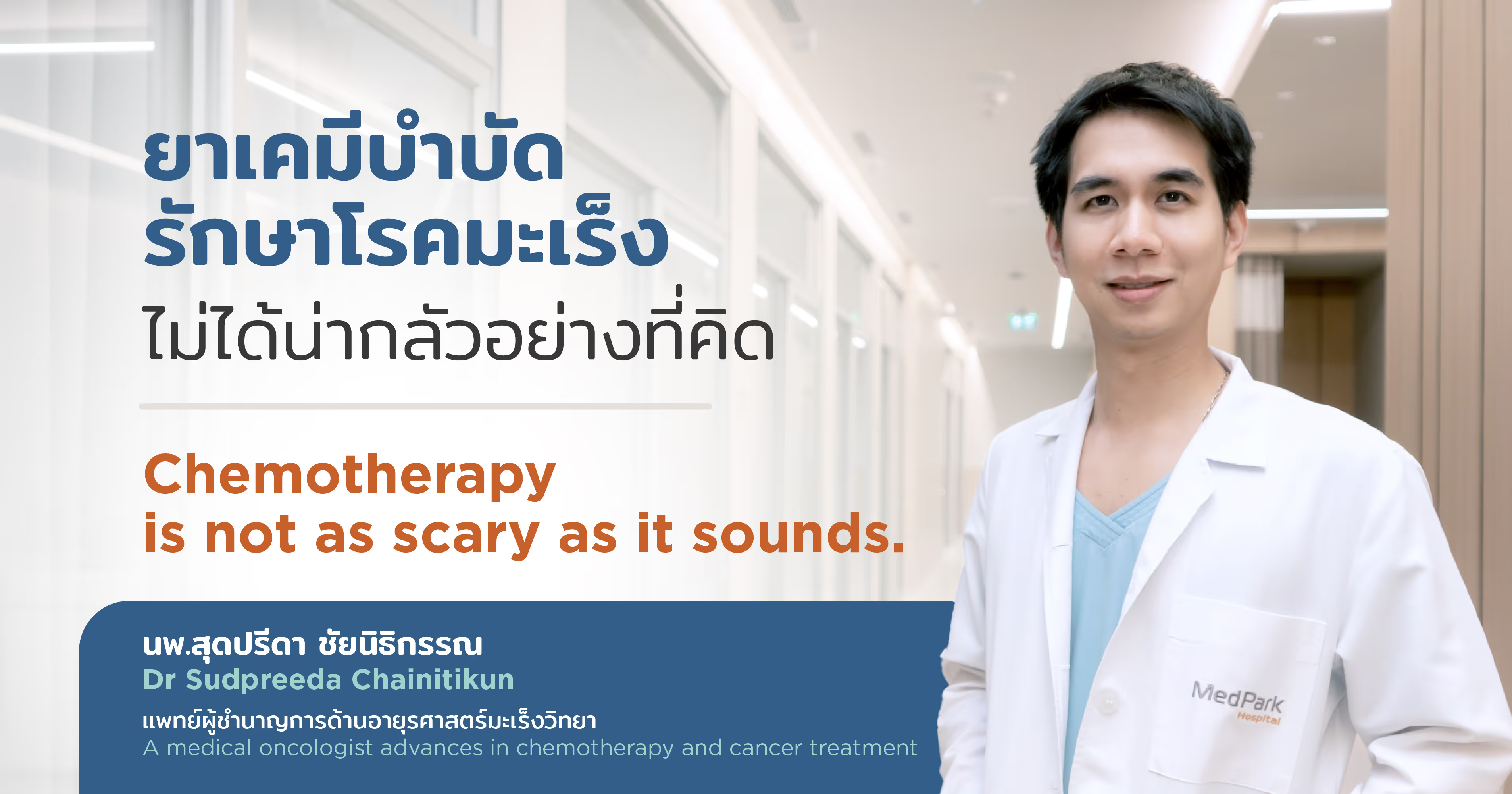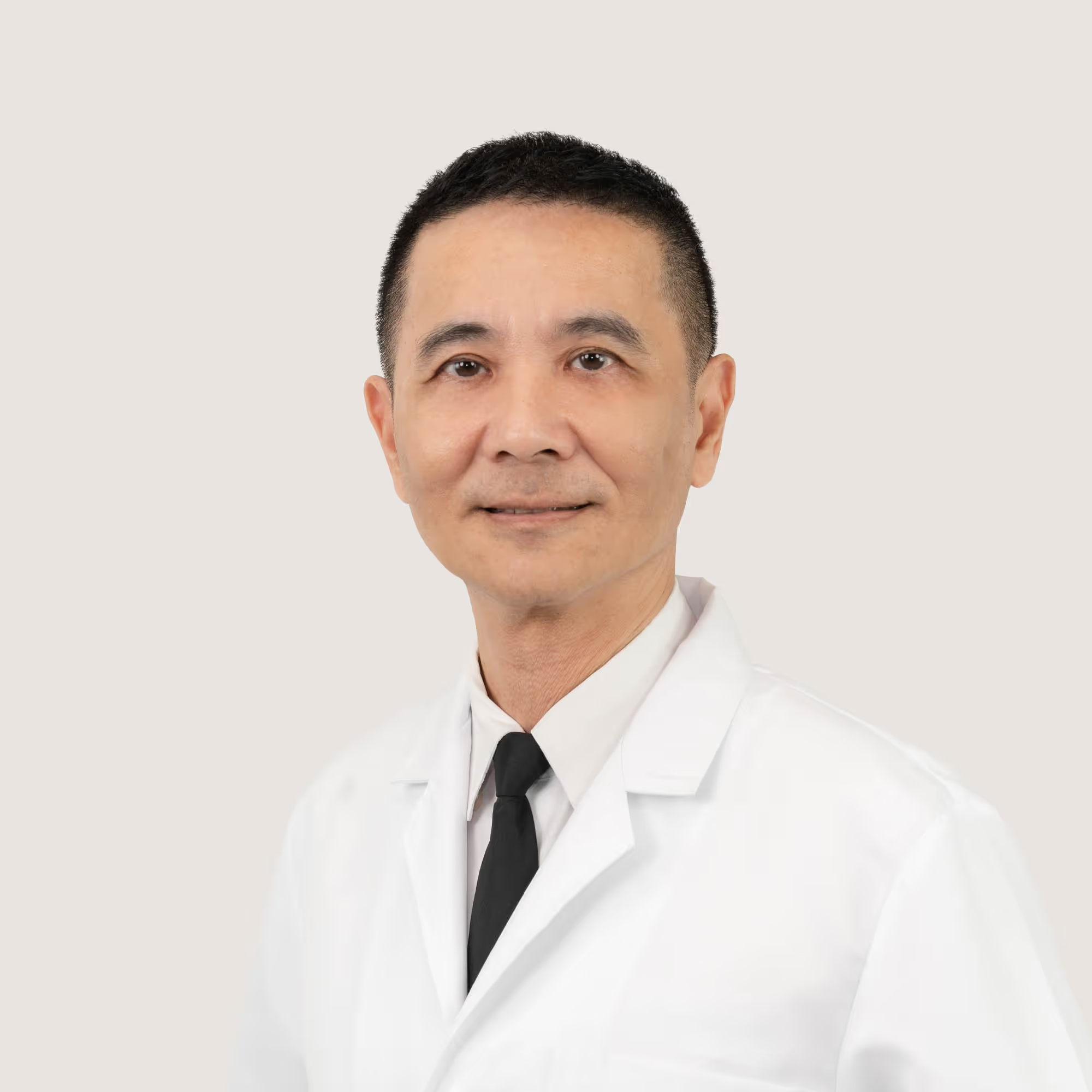Chemotherapy is not as scary as it sounds
Chemotherapy: a concerning matter for patients
Cancer is one of the leading causes of death worldwide. The cancer treatment can be complex and have side effects, so, understandably, many cancer patients are anxious about it, fearful of the treatment and radiotherapy. In particular, they are most apprehensive about chemotherapy. There is a saying: “Once diagnosed with cancer, patients are more afraid of the treatment than the cancer itself.”
This article interviews Dr Sudpreeda Chainitikorn or Dr Dai, a medical oncologist, to discuss the latest advances in chemotherapy and cancer treatment. We will explore whether chemotherapy is as dangerous as many people fear.
The Role of Chemotherapy in Cancer Treatment
Dr. Dai explains that cancer treatment is no longer limited to chemotherapy. Newer drugs, such as targeted therapy and immunotherapy, are now used concurrently with chemotherapy. However, chemotherapy is still a primary part of treatment, as many newer drugs work best when used in concert with chemotherapy.
“Chemotherapy is still the standard cancer treatment. However, since chemotherapy has been around for a long time, Thai people or most patients may have first-hand experience from seeing patients who have received chemotherapy or watching movies or TV shows, which create the image that they will lose their hair and vomit. Patients are understandably afraid. If you ask if these symptoms are side effects of chemotherapy, the answer is partly true but partly not true.”
Chemotherapy is the primary treatment of about 80-90% of cancers. In a few cases, the cancer is resistant to the therapy, or the drugs are ineffective, so doctors do not use them because the response to chemotherapy varies depending on the type of cancer.
“In general, blood cancers respond better to chemotherapy than solid tumors. Among solid tumors, there is also a range of responses to chemotherapy. For example, breast and lung cancer are more responsive to chemotherapy than kidney cancer.”
“Therefore, the word "chemotherapy" is a broad term because there are hundreds of chemotherapy drug types. The drug selection must depend on the diagnosis of the cancer. We have data on which type of cancer responds to which chemotherapy drug. For example, we know what or how many chemotherapy medicines are necessary for different types of cancer.”
Preventable side effects
The side effects of chemotherapy depend on the type of drug given.
Generally, patients often understand that chemotherapy will cause hair loss, nausea, and vomiting. However, some groups of chemotherapy drugs do not cause hair loss, such as the chemotherapy regimen used to treat colon cancer. On the other hand, the regimen used to treat breast cancer will cause hair loss. Therefore, patients with different types of cancer may experience different side effects from chemotherapy. The factors that determine the side effects of chemotherapy are as follows:
- The type of drug
- Adjunctive medications, such as antiemetics and antihistamines
- The doctor’s calculation of the drug regimen doses.
Nausea and vomiting are less common today than in the past.
“Chemotherapy has been around for a long time, and we have learned that it can cause a lot of nausea and vomiting. As a result, there has been research into new antiemetic drugs. These new drugs are more effective and can stop nausea and vomiting altogether, allowing patients to go about their daily lives as usual, but are also more expensive.”
“Nausea and vomiting are associated with loss of appetite. When patients are not nauseous and vomiting, they can eat normally, which prevents weight loss and malnutrition, often seen in TV dramas.”
Cognizant of the potential side effects,
Doctors can prevent or reduce their severity.
Nowadays, physicians have gained more experience using chemotherapy medicines, so they know how they work and how to prevent side effects. For example, if certain chemotherapy medicines cause nausea and vomiting, they know the suitable antiemetics. If a physician uses chemotherapy medicines that cause chemo rash are administered, antihistamines and antipruritics will also be ready. If using medications that can cause diarrhea to treat cancer, the doctor will give preemptive antidiarrheals in pill or injectable form to forestall diarrhea. The side effects of chemotherapy are not as dreadful as many think.
What are the potential side effects after starting chemotherapy?
Chemotherapeutic agents must be for specific diseases only, almost always for cancer. Outside of cancer, chemotherapy is applicable for immunosuppression for treating autoimmune disorders like SLE. Side effects of chemotherapy can occur during and after administration.
During treatment
Because these drugs are associated with adverse effects that can be acute, while administering chemotherapy, it is essential to have a nurse trained specifically in chemotherapy to monitor the patient for signs of an adverse reaction.
A chemotherapy administration site needs to be in focus, as chemotherapy medications are hazardous. Intravenous chemotherapy can result in extravasation, in which the drug leaks into the subcutaneous space or surrounding tissue. Some chemotherapy medications are highly acidic or basic, and the tissue that the medications leak into may be damaged. Chemotherapy nurses are responsible for observing this side effect and providing prompt medical attention.
Following chemotherapy
During the first two days after chemotherapy, patients may experience nausea and vomiting. If the doctor administers antiemetic drugs before chemotherapy, it can help reduce these side effects. The doctor may also prescribe oral antiemetic drugs for patients to take at home if they continue to experience nausea and vomiting.
Afterward, patients may experience diarrhea and hair loss. Chemotherapy drugs target rapidly dividing cells, including hair cells, nail cells, and cells lining the mouth and digestive tract, which can lead to hair loss, darkened nails, mouth sores, and diarrhea.
In the case of hair loss, if the drug does not reach the hair cells during chemotherapy by using a cooling scalp or cooling cap, a hat that covers the scalp and cools it, this can prevent hair loss. When exposed to cold, the blood vessels constrict, lessening the drug reaching the scalp. However, this method is not 100% effective and can only help to reduce hair loss.
In the case of mouth sores, some chemotherapy drugs can increase the risk of mouth sores. The doctor will prescribe a small amount of steroid for mouth rinses, which can help to prevent them to some extent. For diarrhea, the doctor will prescribe antidiarrheal drugs mentioned before.
“The risk we fear the most is a low white blood cell count, which can occur 7-10 days after chemotherapy. When the white blood cell counts are low, patients are very susceptible to infection. Even a cold can lead to hospitalization or even death. For example, when a healthy person eats food contaminated with microbes, they may experience diarrhea. However, if a patient undergoing chemotherapy eats the same food, they could develop a bloodstream infection and die.”
The problem of low white blood cell counts is particularly evident during the COVID-19 pandemic. We have found that cancer patients are more likely to die from COVID-19 than healthy people with robust immune systems.
Currently, some drugs can stimulate the production of white blood cells, which help to boost the immune system. Twenty-four to forty-eight hours after chemotherapy, patients receive the drug injection to help prevent their white blood cells from becoming too low while at home. This drug is a new approach that helps reduce the side effects of chemotherapy.
Present-day chemotherapy is not as dreadful.
Currently, chemotherapy, often in combination with targeted therapy and immunotherapy, has synergistic effect advantages. Doctors must choose the right combination or select the type that complements each other to improve efficacy. The combined use can help to shrink tumors more effectively, provided that the patient can tolerate the drugs and the side effects are not too severe.
“Combining multiple drugs increases the risk of side effects, but there is one silver lining: the side effects of each drug group are different, so they do not reinforce each other. For example, the most undesirable side effect of chemotherapy is immunosuppression, but immunotherapy or targeted therapy rarely causes immunosuppression. They also do not cause low blood cell counts.”
“On the other hand, combining two types of chemotherapy can cause more immunosuppression than taking a single type of chemotherapy, even though it may be more effective at killing cancer cells.”
“Another advantage of using multiple drugs is that it can compensate for the weaknesses of certain drugs. For example, immunotherapy takes time to exert its effect because it needs to stimulate the immune system to learn how to attack cancer cells. In theory, this can lead to a period when the drug is not yet operative or when the patient is waiting for the drug to work. During this time, the patient may feel worse, and the cancer may continue to grow. To bridge this gap, doctors may use targeted therapy or chemotherapy, which works immediately, to help shrink the tumor. Once the tumor is smaller, the immune system can take over.”
With advances in technology and medicine, doctors can better plan to reduce the side effects of chemotherapy. As a result, many chemotherapy patients can take a day or two off work to receive their treatment and then return to their regular lives without severe symptoms.
“The much-improved drugs reduce or prevent the side effects of chemotherapy, so patients can now have a quality of life close to normal. But one thing that has not changed is the portrayal of chemotherapy in a soap opera,” Dr. Dai said with a smile.
Planning Chemotherapy for Satisfactory Outcomes
Dr. Dai explains that chemotherapy is a complex process requiring collaboration between multiple medical professionals. The physician selects the type of chemotherapy drugs and calculates the dosage. The oncology pharmacist then mixes them in a specialized compounding room to prevent contamination. The nurse verifies the order with the pharmacist and administers the drugs to the right patient, following the prescribed dosage, sequence, and timing. Specially trained chemotherapy nurses safely and effectively administer chemotherapy drugs.
At MedPark, the design of the chemotherapy quarters is so that nurses can always see patients from the counter to ensure if an unexpected event occurs, such as an allergic reaction, nurses can quickly see and assist the patient.
For patients who dislike needles, wish to avoid repeated needle sticks, and want to minimize discomfort, we recommend the insertion of a Port-A-Cath. This device allows medications to be administered directly into the bloodstream on each visit, eliminating the need for repetitive needle insertions. This catheter is particularly beneficial for cancer patients who require ongoing chemotherapy. Frequent needle insertions to administer chemotherapeutic drugs can damage blood vessels, leading to prolonged recovery times. Port-A-Cath placement promotes improved quality of life, as it eliminates the need for repeated needle sticks and allows for convenient medication delivery through the port.
Clinical psychologists are also available to provide psychological support to cancer patients facing anxiety and a diminished quality of life. They offer counseling and emotional support to ease their minds and collaborate in their treatment.
Moreover, at the Cancer and Hematology Center of MedPark Hospital, patients have direct communication channels through the Line application of the center. This convenient method allows patients to address minor concerns, ask questions, check appointments, or reschedule without navigating multiple departments. Dr. Dai emphasizes that close monitoring and care help foster patient trust and cooperation in treatment.
Given the diversity of cancer types and chemotherapy options, extensive internet searches can lead to unnecessary anxiety. It is best to consult a specialist. Dr. Dai advises.
“Since cancer varies from person to person, even if it is the same disease, treatment approaches may differ. So, do not assume your treatment regimen will be the same as someone else, having the same cancer type.”
The side effects of chemotherapy can be severe but are usually manageable. With careful planning and support, most patients can tolerate chemotherapy without significant problems.








